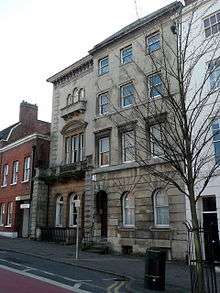John Billing
John Billing, FRIBA was an architect from Reading, Berkshire. His grandfather Richard Billing (circa 1747–1826),[3] father Richard Billing (1784–1853), brothers Richard (1814–84) and Arthur (1824–96) and nephew Arthur Ernest (died 1920) were also architects.[2]
John Billing | |
|---|---|
 | |
| Born | 1816[1] or 17[2] |
| Died | 1863[1][2] |
| Nationality | British |
| Occupation | Architect |
| Buildings | St. Giles' parish church, Tetsworth |
Career
Until at least 1854 John Billing practiced in Reading, Berkshire, where he was Borough Surveyor.[4] Billing addressed a meeting of the 1849–50 session of the Oxford Architectural Society on the subject of "Parsonage Houses".[5]
Billing had moved his practice to London by 1856, in which year he was made a Fellow of the Royal Institute of British Architects.[1] Philip Webb (1831–1915) was a pupil of his.
Works
- Christ Church Cathedral, Oxford: repairs, 1853–56[6][7]
- St. Giles' parish church, Tetsworth, Oxfordshire, 1855[8]
- St. Mary's parish church, Sydenham, Oxfordshire: restoration, 1856[9]
- St. Leonard's parish church, Seaford, East Sussex: transepts and apse, 1861–62[10]
- St. Katherine & St. Leonard's Rectory, Drayton St. Leonard, Oxfordshire, 1862[11]
gollark: As far as I know most of them are UTTERLY undifferentiated and just pull from YouTube, reencode to 64kbps or whatever Opus, and stick them on the voice channel.
gollark: Also, does anyone know *why* there are *so many* music bots?
gollark: kbps is kiloBITS per second, utter sonata.
gollark: Doing so...
gollark: Opus is highly compressed; if you just dropped half the packets, it would probably break horribly.
References
- Brodie, 2001, page 180
- Colvin, 1997, page 124
- Colvin, 1997, page 123
- Dils, Joan A (1999). "From Village to Suburb: Caversham 1840 to 1911". Oxoniensia. Oxfordshire Architectural and Historical Society. LXIV: 92.
- Prout, David (1989). "'The Oxford Society for Promoting the Study of Gothic Architecture' and 'The Oxford Architectural Society', 1839-1860". Oxoniensia. Oxfordshire Architectural and Historical Society. LIV: 387.
- Sherwood & Pevsner, page 115
- Tyack, 1998, page 225
- Sherwood & Pevsner, page 805
- Sherwood & Pevsner, page 801
- Nairn & Pevsner, 1965, page 603
- Sherwood & Pevsner, page 588
Sources
- Brodie, Antonia; Felstead, Alison; Franklin, Jonathan; Pinfield, Leslie; Oldfield, Jane, eds. (2001). Directory of British Architects 1834–1914, A–K. London & New York: Continuum. p. 180. ISBN 0-8264-5513-1.
- Colvin, H.M. (1997). A Biographical Dictionary of British Architects, 1600–1840. New Haven: Yale University Press. pp. 123–124. ISBN 0-300-07207-4.
- Nairn, Ian; Pevsner, Nikolaus (1965). Sussex. The Buildings of England. Harmondsworth: Penguin Books. p. 603. ISBN 0-14-071028-0.
- Sherwood, Jennifer; Pevsner, Nikolaus (1974). Oxfordshire. The Buildings of England. Harmondsworth: Penguin Books. pp. 115, 588, 801, 805. ISBN 0-14-071045-0.
- Tyack, Geoffrey (1998). Oxford An Architectural Guide. Oxford & New York: Oxford University Press. p. 225. ISBN 0-19-817423-3.
This article is issued from Wikipedia. The text is licensed under Creative Commons - Attribution - Sharealike. Additional terms may apply for the media files.